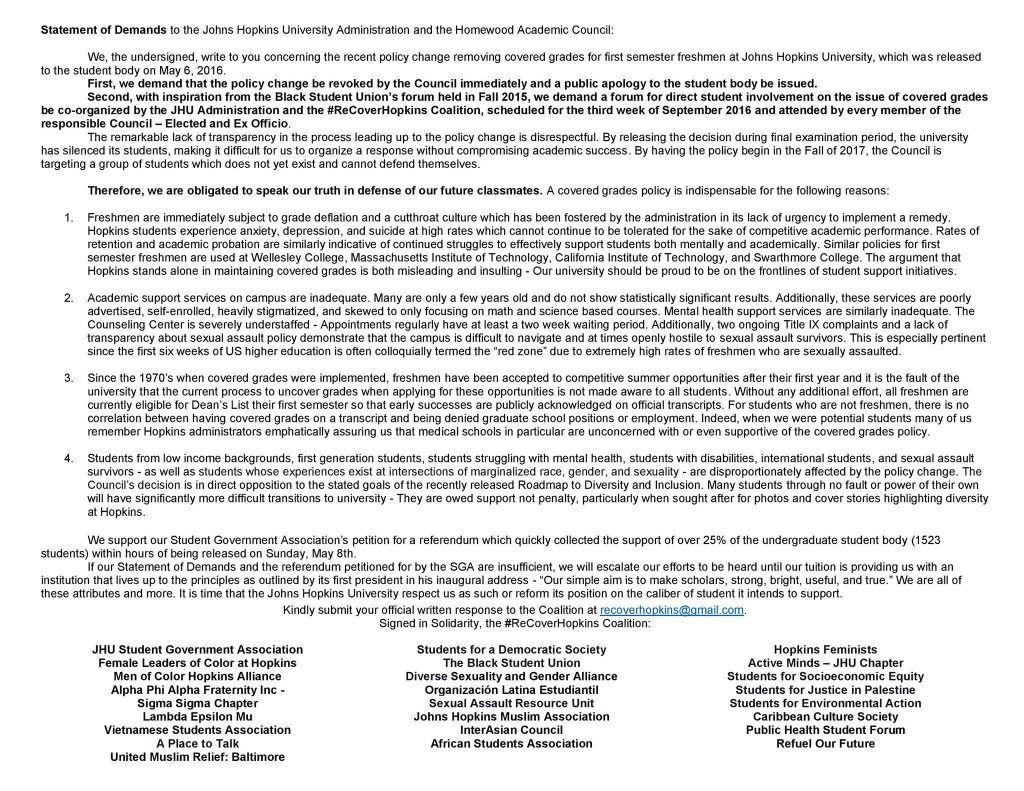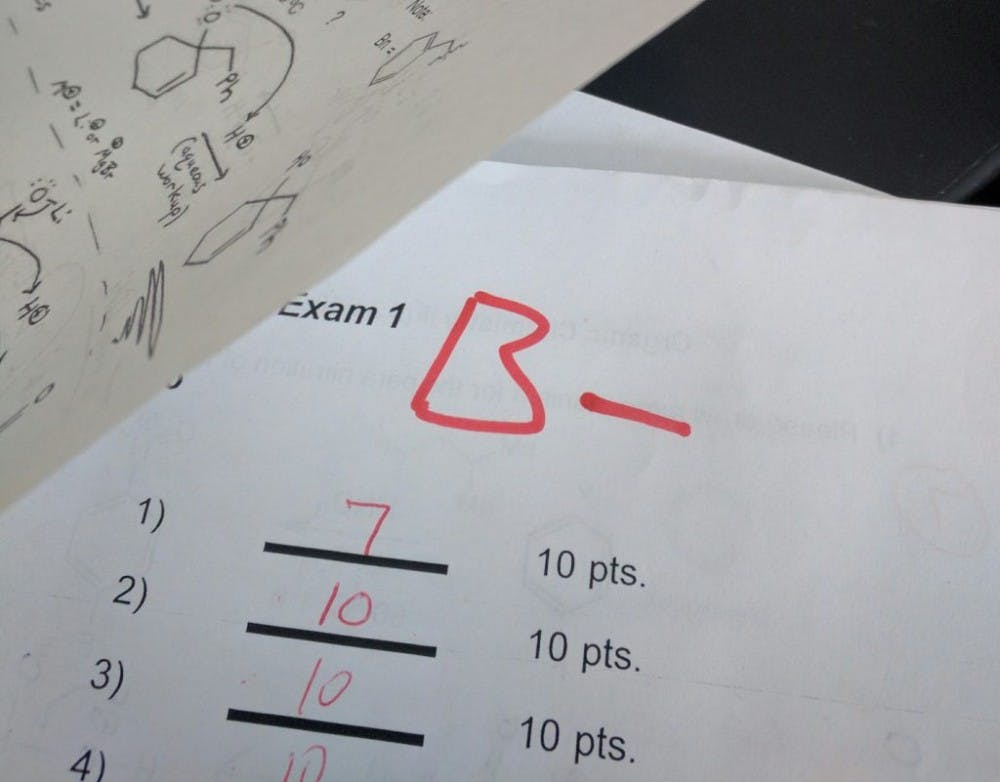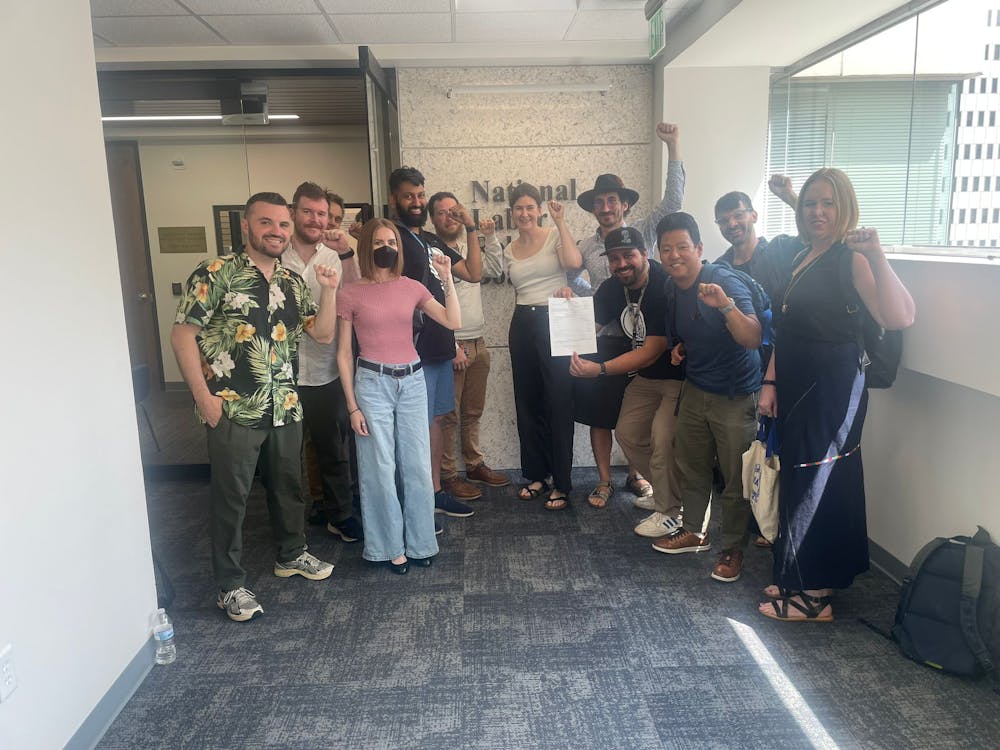Student groups have mobilized and formed the #ReCover Hopkins Coalition in protest of the University’s decision to end covered grades in the fall of 2017 and the University’s lack of transparency in finalizing the decision.
This morning at 9 a.m, #ReCoverHopkins sent a statement of demands to the Homewood Academic Council (HAC) and the administration.
The Statements of Demands called for an immediate revocation of the policy change by the HAC and for their to be a formal apology to the student body. Additionally, it called for an open forum be held in the fall with the entire HAC in attendance, which includes University President Ronald J. Daniels.
The statement also offered several counterpoints to the University’s decision to remove covered grades.
The document argued that the academic rigor of Hopkins makes covered grades a necessity for students. Citing the similar policies of several peer institutions such as the Massachusetts Institute of Technology, Wellesley College and the California Institute of Technology, the Statement noted that Hopkins is not alone in implementing this policy.
It also argued that current academic support and mental health services are inadequate for students.
“Academic support services on campus are inadequate. Many are only a few years old and do not show statistically significant results. Additionally, these services are poorly advertised, self-enrolled, heavily stigmatized, and skewed to only focusing on math and science based courses,” the statement reads. “Mental health support services are similarly inadequate. The Counseling Center is severely understaffed - Appointments regularly have at least a two week waiting period.”
Furthermore, it argued that the presence of covered grades on a transcript does not negatively affect employment or graduate school applications.
Finally, the statement argued that the removal of covered grades disproportionately harms students of marginalized communities, especially students struggling with mental health or coming from the intersections of marginalized race, gender or sexuality.
#ReCoverHopkins consists of more than 24 student groups, including the Student Government Association (SGA), the Black Student Union (BSU), Hopkins Feminists and the Hopkins chapter of Active Minds.
In #ReCoverHopkins’ statement of demands, they also support the steps so far taken by the SGA.
SGA sent out a school-wide petition on Saturday to bring back covered grades, which has already garnered over 1,500 student signatures, around one quarter of the student body. The SGA Constitution requires that at least 15 percent of the study body sign a petition for an official referendum to be held. At an emergency general body meeting Sunday evening, SGA and several representatives from other student groups came to discuss the petition and what steps to take moving forward.
After a unanimous vote, SGA will be sending a school-wide email tomorrow containing a referendum where students will get to formally show their support for or rejection of covered grades. In the email, they will also include an additional survey put together by members of the #ReCoverHopkins Coalition to collect data on the effects of covered grades on the freshman experience.
SGA Executive President Charlie Green wrote that SGA will continue to take additional steps as student support grows.
"We are really excited about the response from students surrounding the petition. We have gotten over 1500 responses in the past 9 hours which is almost a quarter of all undergraduates at Hopkins,” Green wrote in an email to The News-Letter. “SGA would really like to continue and progress our role on campus of being the voice for students throughout this year, and we would also like to work with other student groups to achieve this."
SGA Executive Vice President Anna Du echoed these sentiments and stressed the importance of working together with various student groups.
“These next steps include alerting the student body that the Senate unanimously voted to conduct a campus wide referendum and that the SGA has signed a statement which was crafted by more than 13 undergraduate student organizations.” Du said. “Collectively we’ll work together as a group to move forward.”
AJ Tsang, a sophomore class senator, also emphasized that SGA should continue to work with #ReCoverHopkins moving forward.
“At this point, what's important is that SGA follow through on the promises it made tonight... SGA did promise to work with the Coalition (and the additional 13 that have signed on since yesterday) as soon as the petition and referendum results are analyzed,” Tsang wrote in an email to The News-Letter. “What I hope to see as a Senator - and what I will strive to do as a Senator no matter what happens – is to continue collaboration between SGA and the Coalition in voicing student concerns to the Administration and forming a cohesive moment to reverse the covered grades decision. SGA can't do this alone – and really, no one can do this alone - this needs to be a unified effort from everyone.”
Linda Horn, co-president of Hopkins Feminists, said that covered grades are a critical piece of support for incoming freshman and was pleased to see students work together to repeal the decision.
“I am glad to see student leaders coming together to react to something that we as a student body obviously feel is an important part of the Hopkins experience,” Horn wrote in an email to The News-Letter. “Even though it won't affect us personally, it's nice to see that many students care enough about the future of this school that they are taking time out of their busy finals schedules to react to this policy change. Whether its #ReCoverHopkins or the SGA, we are all working towards a common goal here in defense of the covered grades policy, which obviously meant something to all of us as first semester students and as Hopkins students at large.”
On their Facebook page, #ReCoverHopkins confronted the University on the policy change and demands accountability and transparency.
“The remarkable lack of transparency in the process leading up to the policy change is disrespectful. By releasing the decision during final examination period, the university has silenced its students, making it difficult for us to organize a response without compromising academic success. By having the policy begin in the Fall of 2017, the Council is targeting a group of students which does not yet exist and cannot defend themselves,” the Facebook page states. “Therefore, we are obligated to speak our truth and demand both a solution and accountability in defense of our future classmates.”
Senior Class Senator and President-elect of the BSU Tiffany Onyejiaka disagreed with the University’s decision to remove covered grades without consulting students.
“I am dissatisfied about the Hopkins’ administration’s decision to end covered grades for freshmen in their fall semesters because this is just another example of the administration applying policies without understanding the context of the student experience at an institution as rigorous as Hopkins,” Onyejiaka wrote in an email to The News-Letter. “When administration sought to end this, they went to research but never once did they come to students. They never once asked students what they thought or felt before instituting a policy that will profoundly affect the first year experience for incoming freshman at Hopkins and affect the lives of every future Hopkins student. To change a covered grades policy that still benefits the vast majority of students across majors and schools at Hopkins is inconsiderate to the student body.”

Sophomore Class President Noh Mehbrahtu said that the University did not solicit enough student input when making its decision.
“There are so many things wrong with the decision to remove covered grades, but let’s start off not with the actual decision but with the timing and reasoning of why now,” Mehbrahtu said. “The administration intentionally planned on neglecting to inform me about it all, so without student representation, [the administration] made a decision that will have a huge impact on the freshmen — then, the underhanded tactics of emailing during finals knowing full well that students will be too busy to fight this and protest. I expected better from this administration.”
Adelaide Morphett, a senior class senator and member of the SGA’s academic affairs committee, agreed with Mehbrahtu.
“As a member of the Academic Affairs Committee on the SGA, I was surprised to not have heard about the decision before it was released in the school-wide email. It is my understanding that the executive board was consulted, and although I respect the trust that Dean Schlesinger and Dean Wendland have in them, I think it would have been a courteous gesture to consult other members of the SGA,” Morphett wrote in an email to The News-Letter. “The more students consulted, the wider the range of constituents represented. Additionally, I think that reaching out to student groups who represent those widely affected by the transition into college — international students and those who combat learning disabilities — should have been more concertedly consulted. “
SGA had been consulted following the HAC’s initial moves in 2011 and 2012, but Morphett emphasized that the current SGA should have been a part of the discussion when making the final decision to end covered grades.
“I do believe it should have been a necessity to consult the SGA before finalizing the decision,” Morphett said. “The representatives who provided input in 2012 no longer attend this institution, and the deans who issued the decision were not involved in the conversation in 2012.”
Multiple students expressed disagreement with the University’s decision.
John Hughes, president of the Hopkins’ chapter of Active Minds, argued the University’s argument was flawed in claiming covered grades encouraged poor study habits.
“The HAC claims that part of their reasoning is that freshman weren't gaining study experience during their covered semester. But how can that be pinned on covered grades, when the demand for University student support services, like PILOT, exceeds supply, during both semesters? Or when the demand for counseling services exceeds supply, in both semesters?” Hughes wrote in an email to The News-Letter. “ Rather than unilaterally blaming covered grades for the issue, the HAC should have engaged with the student body to determine where the missing link was.”
Hughes also wrote about the potential ramifications of the decision on the mental health of students from marginalized communities.
"These changes are going to most impact the most vulnerable students, those who are coming from marginalized communities, those facing mental health struggles, those struggling to afford college,” Hughes wrote. “Why were these students not consulted as to what was holding them back? Why did we jump to the conclusion that students are being made lazy by covered grades, rather than interrogating other systems that could be holding students back?”
Despite not personally benefitting from covered grades, Horn noted that the policy is helpful for students in adapting to the academics at Hopkins.
“I personally didn't benefit from covered grades, I am a student who the Homewood Academic Council thinks the policy ‘hurts’ because I performed well my first semester here,” Horn wrote in an email to The News-Letter. “But that doesn't mean I think the policy should be removed, because it is helpful to many students in adapting to both a college lifestyle and workload for the first time. It helped combat the prevalent "sink or swim" culture on campus that is detrimental to students.”
However, not all students, like freshman James Lubowsky, are in favor of covered grades.
"Covered grades is a dumb concept. It is not Hopkins responsibility to hold our hands. In the real world, we will see what works and what doesn't. Better to start earlier than later," he wrote in an email to The News-Letter. "I feel guilty fooling around with work in general since my parents pay a lot for me to go here. I don't think they would like to hear that I got all C's in my classes just because they wouldn't count."
Jesse Rines is not in favor of how and when the University announced the change, but is in favor of ending covered grades.
"If the goal of covered grades is to help freshmen adjust to college, the worst way to do that is to get them used to a study schedule that doesn't actually put pressure on them to learn the material," he wrote in an email to The News-Letter. "[C]overed grades simply delay the actual stress of Hopkins by one semester, exacerbating the effects of Hopkins mental stress by reinforcing bad study habits in the first semester; secondly, students learn less in the first semester from vital intro courses that are the foundation for future classes, thus causing mental health issues in later classes they are not prepared for after not being forced to learn material in their first semesters."
Rines said that covered grades punish students who do well first semester.
"We pay 30,000 bucks per semester here, roughly, to get the chance to build our resumes off of Hopkins classes; yet our first classes are the classes with the easiest material, representing a chance to get off to a great start with our grades," he wrote. "This is especially tough for applying for internships after sophomore year, when all we can report is 3 semesters."
Current Junior Class Senator and BSU President Matt Brown said covered grades provide an academic safety net for students.
“Even though covered grades won’t directly affect any of the students that are here right now, we have to still realize that for the students coming in, covered grades is something important. It is something to help them to get used to and acclimate to the Hopkins atmosphere,” Brown said. “Hopkins is a very difficult school and covered grades is a way to give freshmen a little bit of a safety net to get used to college and the different things that happen, like living on your own for the first time.”
Brown said covered grades give freshmen the opportunity to pursue other campus activities.
“Covered grades... lets them explore different avenues that they want to express themselves, such as extracurriculars like arts groups on campus, sports, or just making friends,” Brown said. “I think that if we didn’t have covered grades, a lot of freshman would have just not chosen to do extracurriculars and use that time for only studying. Yes, studying is very important, and I definitely encourage freshmen to make sure they’re keeping their academics in order, but they also need to have healthy outlets to relieve them of any stress that they might have from academics.”
Sam Fossum and Kelsey Ko contributed reporting.
Correction: This article previously stated that SGA requires 1,000 signatures for a referendum to be called. It actually requires 15 percent of the student body. The SGA petition's goal was 1,000.





